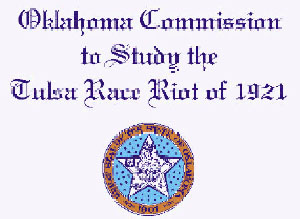
Tulsa Race Riot
A Report by the Oklahoma Commission to Study the Tulsa Race Riot of 1921 February 28, 2001
February 21, 2001
|
COMMISSIONERS: |
CHAIRMAN: |
|
Currie Ballard, Coyle |
T. D. "Pete" Chruchwell, Tulsa |
|
Dr. Bob Blackburn, Oklahoma City |
|
|
Joel Burns, Tulsa |
SPONSORS: |
|
Vivian Clark, Tulsa |
Sen. Maxine Horner, Tulsa |
|
Rep. Abe Deutschendorf, Lawton |
Rep. Donn Ross, Tulsa |
|
Eddie Faye Gates, Tulsa |
|
|
Jim Lloyd, Tulsa |
ADVISORS: |
|
Sen. Robert Milacek, Wauikomis |
Dr. John Hope Franklin, Durham NC |
|
Jimmie L. White, Jr., Checotah |
Dr. Scott Ellsworth, Portland OR |
|
|
|
|
February 21, 2001 |
|
|
|
|
|
Honorable Frank Keating |
Honorable Susan Savage |
|
Governor of Oklahoma |
Mayor of Tulsa |
|
Oklahoma City, Oklahoma 73105 |
Tulsa, Oklahoma 74119 |
|
|
|
|
Honorable Larry Adair |
Members of the City Council |
|
Speaker of the House of Representatives |
City of Tulsa |
|
Oklahoma City, Oklahoma 73105 |
Tulsa, Oklahoma 74119 |
|
|
|
|
Honorable Stratton Taylor President |
|
|
Pro Tempore of the Senate |
|
|
Oklahoma City, Oklahoma 73105 |
|
Dear Sir or Madam:
Pursuant to House Joint Resolution 1035 (1997), as amended, I have the honor to transmit here with the Final Report of Findings and Recommendations of the 1921 Tulsa Race Riot Commission. The report includes the commission's findings on each specific item assigned it by statute, and it also explains the methods and processes that led to those findings. In addition, the commission has exercised the option, granted it by law, to make recommendations concerning reparations related to the tragedy.
This Commission fully understands that it is neither judge nor jury. We have no binding legal authority to assign culpability, to determine damages, to establish a remedy, or to order either restitution or reparations. However, in our interim report in February, 2000 the majority of Commissioners declared that reparations to the historic Greenwood community in real and tangible form would be good public policy and do much to repair the emotional and physical scars of this terrible incident in our shared past. We listed several recommended courses of action including direct payments to riot survivors and descendants; a scholarship fund available to students affected by the riot; establishment of an economic development enterprise zone in the historic Greenwood district; a memorial for the riot victims.
In the final report issued to day, the majority of Commissioners continue to support these recommendations. While each Commissioner has their own opinion about the type of reparations that they would advocate, the majority has no question about the appropriateness of reparations. The recommendations are not intended to be all inclusive, but rather to give policy makers a sense of the Commission's feelings about reparations and a starting place for the creation of their own ideas.